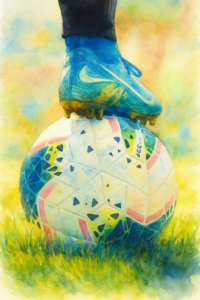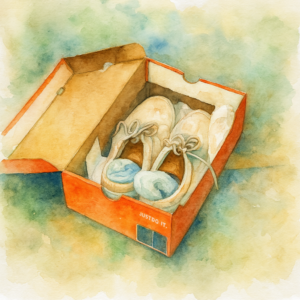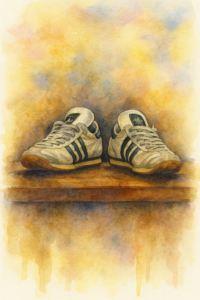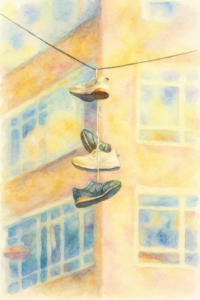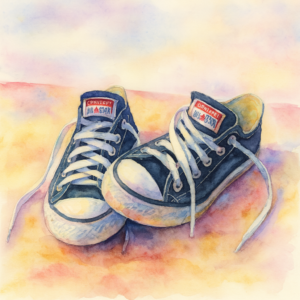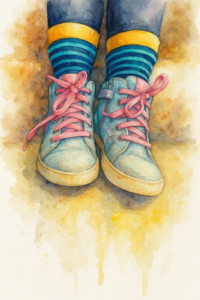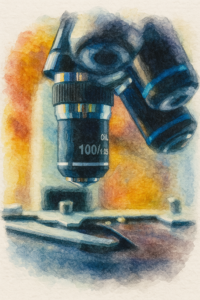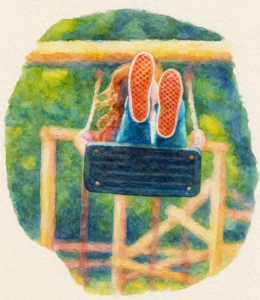Learn French with this clip from Les P’tits Bateaux. Find the full episode here. We do not own the content. The above audio sample and transcription is from Les P’tits Bateaux podcast. We do not own the content. Listen to the entire episode here. The wall What’s opening up for you with this clip? Comment…
Start quiz, type what you hear, then join the conversation.
Did you find this one challenging or easy? Did you hear something diffferent? What surprised you? What levels did you complete? Comment below and share what’s opening up for you with this quiz.
Learn French with this clip from Les P’tits Bateaux. Find the full episode here. We do not own the content.
The above audio sample and transcription is from Les P’tits Bateaux podcast. We do not own the content. Listen to the entire episode here.
The wall
What’s opening up for you with this clip? Comment below with what was surprising, easy, challenging and/or interesting.
The snippet in English
Find a translation of this snippet here, how much of this did you hear?
Alors c’est en fait dans des régions très particulières : c’est par exemple Dresde, en Allemagne, parce que vous avez des rochers — on appelle ça la Suisse saxonne.
Et en France, c’est à la forêt de Fontainebleau.
Donc il y a tout un mouvement qui est plutôt porté par les syndicats, par la gauche travailliste.
L’idée, que il faut que tout le monde est accès à la montagne.
À l’époque, on n’appelait pas ça l’escalade, on appelait ça la varappe, parce que vous avez le même mouvement en Suisse, près de Genève, où il y a un mont — le mont Salève, et il y a la paroi de la Varappe.
So it’s actually in very particular regions: Dresden, for example, in Germany, because you have rocks – we call that Saxon Switzerland.
And in France, it’s in the Fontainebleau forest.
So there’s a whole movement that’s driven more by the unions, by the Labour left.
The idea was that everyone should have access to the mountains.
At the time, they didn’t call it climbing, they called it varappe, because you have the same movement in Switzerland, near Geneva, where there’s a mountain – Mont Salève, and there’s the Varappe wall.
The above translation from Deepl
What does “est plutôt porté” mean?
est plutôt porté — is rather inclined / tends to lean
Il est plutôt porté sur les débats philosophiques que sur les discussions pratiques.
(He tends to be more interested in philosophical debates than practical discussions.)
Usage notes: Spoken and written; mildly formal. Often followed by sur + topic/interest.
Nuance: Suggests a natural tendency or preference, often recurring. Softer than saying someone loves something — implies interest or inclination rather than passion.
Cultural note: In French, être porté sur can also suggest obsession or fixation, especially with les femmes, l’alcool, etc. Tone depends on context — neutral to lightly judgmental.
What does “les syndicats” mean?
les syndicats — labor unions
Les syndicats ont organisé une grève pour protester contre la réforme des retraites.
(The labor unions organized a strike to protest against the pension reform.)
Usage notes: Common in news, politics, and workplace contexts. Neutral and widely used in both spoken and written French.
Cultural note: In France, les syndicats are highly visible and active in defending workers’ rights. They play a major role in organizing strikes (grèves), especially in the public sector. Union culture is more militant and politicized in France compared to some other countries.
What does “la gauche travailliste” mean?
La gauche travailliste refers to the labor-oriented left in French politics, typically associated with defending workers’ rights, social justice, and public services. The term isn’t tied to a single political party but often aligns with the Parti Socialiste or more grassroots movements and unions that prioritize labor issues over ideological debates.
Culturally, la gauche travailliste emerged from France’s strong union tradition and post-WWII social protections, like universal healthcare and pensions. It values the role of the working class (les ouvriers) and civil servants (les fonctionnaires) in shaping a fair society. Strikes, protests, and public demonstrations are seen as legitimate tools of political expression—something deeply rooted in French civic life.
Compared to more intellectual or progressive branches of the left, la gauche travailliste tends to be pragmatic and focused on bread-and-butter issues: wages, job security, retirement, and public sector defense. It’s often contrasted with more urban, green, or liberal-left movements that emphasize identity, ecology, or global justice.
What does “la paroi” mean?
La paroi — (wall, partition, or surface)
Les alpinistes ont escaladé une paroi rocheuse presque verticale.
(The climbers scaled an almost vertical rock face.)
Usage notes: Mostly used for natural or structural surfaces — cliffs, rock faces, shower walls, or interior partitions. Less common for general room walls (which are usually murs).
Cultural note: In climbing and hiking contexts, paroi evokes difficulty and verticality — often used in sports or adventure settings. In everyday use, it appears in expressions like paroi de douche (shower wall).”
Les P’tits Bateaux Podcast
Official synopsis: Les enfants posent des questions, des spécialistes leur répondent. Jeunes (et moins jeunes !) peuvent poser toutes les questions possibles et imaginables directement par message vocal via franceinter.fr, sauf pendant les vacances.
I recently discovered this podcast from InterFrance and love it. It’s kids posing questions and the host brings in experts to explain. And it’s aimed at young French kids, not French learners. That’s my favorite kind of content. Being for French kids is what makes it so good.
You’ve got real people (a kid, a host, and an expert), all speaking real French — no AI generated stuff here. The kid asks a question, and then an expert explains it in short, clear language. There’s a ton of repetition, natural turns of phrase, and just enough challenge to keep your ears working.
And because it’s meant for French-speaking kids, the adults naturally explain things simply but not condescendingly. You get exposed to rhythm, tone, interjections (bah, ben, alors), and full sentences — but also some real dialogue dynamics. And that’s gold if you’re trying to move from textbook filler to actually speaking and thinking in French.
Improving your French Listening Comprehension with Podcasts
On this site, fast spoken French is finally accessible to all levels. The tool break podcasts into short clips each set to transcription fill-in-the-blank practice. My favorite practice in class is always dictées. While they can seem overwhelming at first, the confidence boost and skills payoff for doing the work pays off. They’re perfect for anyone at any level, from advanced students to those just starting.
We use podcasts and our practice exercises to make it possible for anyone, anywhere to immerse in French with fun and ease. Join us and enjoy French, one short clip at a time. Let’s learn together!
Make the most of the site:
- Daily Podcast Listening: Start your day with a French podcast from our collection. Choose episodes that align with your interests to keep it engaging.
- Active Listening Practice: As you listen, try to pick out key phrases and vocabulary. Use our daily quizzes to test your understanding and reinforce learning.
- Repeat and Shadow: Listen to the same podcast segment multiple times. Try to mimic the pronunciation and intonation to improve your spoken French.
- Note-taking: Jot down new words or phrases you encounter. Review these notes regularly to enhance vocabulary retention.
- Reflect and Respond: After each episode, summarize the main points in French, either in writing or aloud. This helps in consolidating your learning and improving your expressive skills.
- Read More:
- True Beginner or A1 Learners: discover tips learning with podcasts at an introductory level.
- Discover all the podcast clips on FrenchIRL organized by level.
- Top Tips: Here’s how I make the most of my own site.
I created the French In Real Life project because I wanted to understand more than just my teacher and youtubers who cater to learners. I wanted to understand the French I hear in France. I hope you can benefit as much as I have. Become a supporting member for access to all clips.
What’s opening up for you?
Comment below with what’s opening up for you with this clip. What do you love about this? What was challenging? What was easy? Share your learning progress below!
Learn French with this clip from Les P’tits Bateaux. Find the full episode here. We do not own the content. The above audio sample and transcription is from Les P’tits Bateaux podcast. We do not own the content. Listen to the entire episode here. The wall What’s opening up for you with this clip? Comment…
Start quiz, type what you hear, then join the conversation.
Did you find this one challenging or easy? Did you hear something diffferent? What surprised you? What levels did you complete? Comment below and share what’s opening up for you with this quiz.

